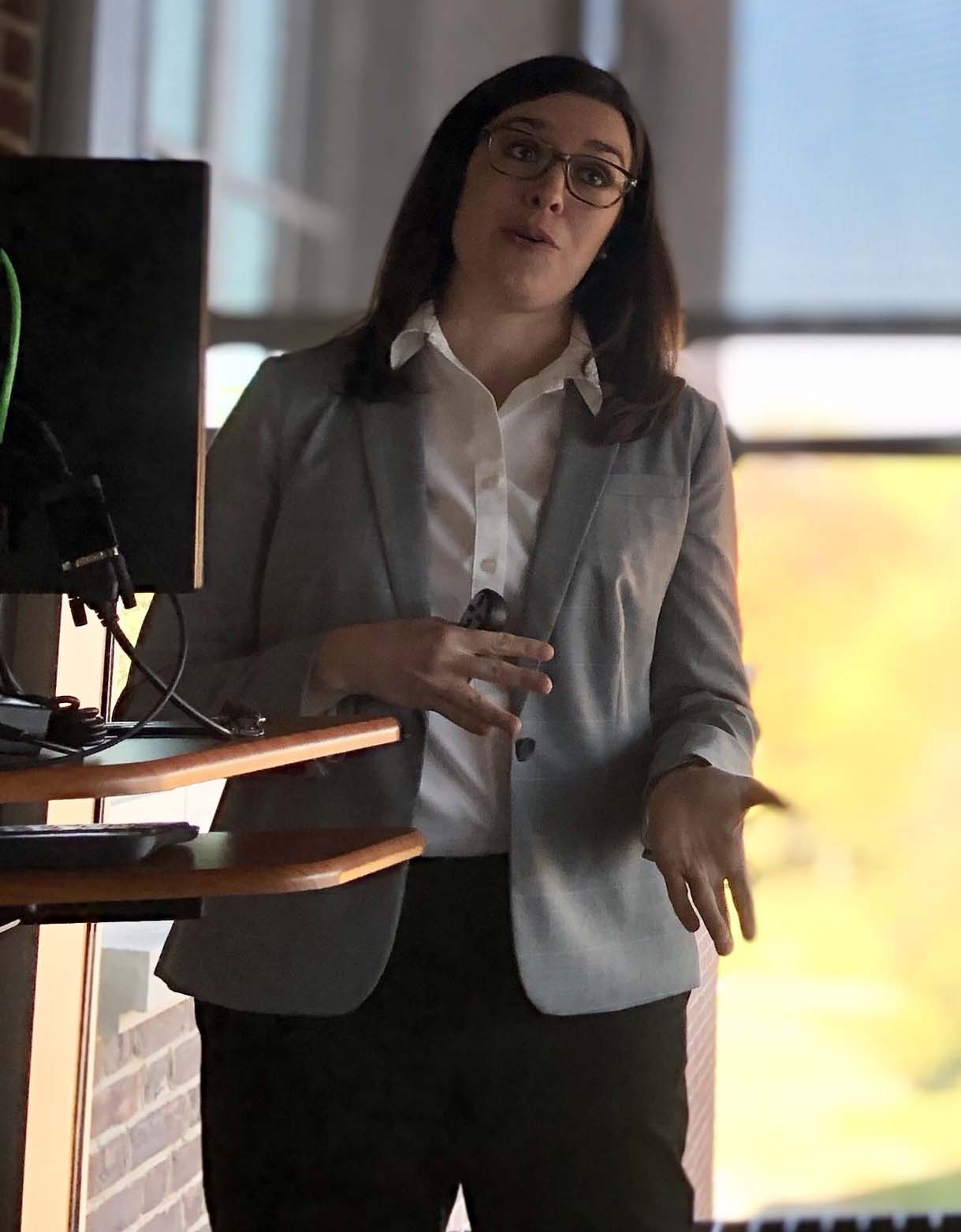Caregiving with style: understanding different approaches to care
Return to Transitions Newsletter
by Cheryl Deep

Amanda Leggett's first exposure to older adults came when she got a job as a waitress in an assisted living facility. She was a student whose own grandparents had passed away when she was young. "I had no familial experience with older people, but I really enjoyed that job," she said. "I realized I had a love for working with older adults."
Dr. Leggett, Ph.D., FGSA, is a new assistant professor at Wayne State, jointly appointed to the IOG and the Department of Psychology. She is principal investigator on two grants. One is from the Alzheimer's Association on styles of dementia caregiving. The second is a nearly $2 million, 4-year R01 grant from the National Institute on Aging (NIA) to study the impact of different networks of caregivers on the health of persons with dementia. Her work on delineating caregiving styles among informal caregivers and developing tailored interventions to improve caregiving outcomes has upended the traditional view that caregiving is "one size fits all."
"Yet I didn't set out to study caregiving," she said. Dr. Leggett got her master's and doctoral degree in human development and family studies. She enjoyed working with children and adolescents yet felt called toward the older adults from her waitressing job. She also saw value in a lifespan perspective personally and professionally. Caregiving research offered the perfect marriage of these passions. By studying caregiving, Dr. Leggett works across generations with older care recipients and the generations of family and friends who help them. "I get to interview spouses, adult children, grandchildren, nieces, nephews, neighbors. It approaches caregiving in a unique, intergenerational way I really enjoy."
Uncovering patterns in caregiving
In 2017, Dr. Leggett received a K Award from the NIA to study caregiving styles for persons with dementia and their effect on health. K awards provide early career support to high-potential candidates to help them conduct independent research and compete for major grants. Dr. Leggett interviewed 100 primary caregivers and administered tests of their behavioral approach, flexibility and understanding of dementia. As she analyzed the data, five caregiving styles began to emerge. Next she described these profiles to physicians, nurses, and other clinicians who affirmed that they had seen these styles in their patients. Dr. Leggett had tapped into a new way to understand caregiving and thus tailor interventions to help caregivers be more effective.
Caregiving styles are not judged or ranked. "Every profile has strengths and room to grow," Dr. Leggett said. "Some styles may be hard to work with in a support group, or be better suited to certain phases of dementia, but there is no optimal style. By understanding the styles, our interventions with caregivers can have more impact, we can speak their language." She also realizes that very few persons with dementia are cared for by only one person. So her newest project explores broader networks of multiple caregivers to understand how the type of network impacts health outcomes.
"We'll look at data from up to five caregivers for each individual. Then we'll tie health outcomes like depression and sleep quality to types of networks. Does one type of network keep mom out of the ER or does it take her to the ER when the problem could have been handled at home?" The ultimate goal is tailored interventions to help caregivers provide good care while staying healthy themselves.
Three things she loves
Dr. Leggett's position at the IOG allows her to research, teach and mentor the three things she most enjoys. "I want to encourage the next generation of researchers in aging." For years she has known of the IOG's strong work with dementia and vulnerable populations through the Michigan Alzheimer's Disease Research Center, a combined WSU, U-M and MSU effort to study non-amyloid causes of Alzheimer's. Dr. Leggett has been part of its leaders' initiative group. "I have a great amount of respect for the work Dr. Lichtenberg and the IOG does with diverse populations and in a multi-disciplinary way." She feels strongly that breakthroughs happen when people from multiple backgrounds study across the lifespan. "This is what motivates and excites me," she said.
Long term, Dr. Leggett is committed to better understanding caregivers and their varied approaches and using that understanding to keep caregivers and recipients healthier, both physically and mentally. "The goal is to tailor treatments and service recommendations to produce the best outcomes," she said. Eventually Dr. Leggett would like to apply this approach to professional caregivers, like nurses' aides. Her research might reveal that a particular style works best with a particular type of patient. Whether it's home care or nursing home care, she is dedicated to improving the experience. "I love doing work that resonates with people," she said.